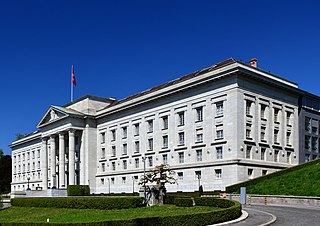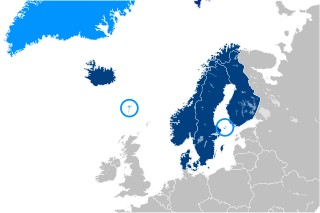
A pension is a fund into which a sum of money is added during an employee's employment years and from which payments are drawn to support the person's retirement from work in the form of periodic payments. A pension may be a "defined benefit plan", where a fixed sum is paid regularly to a person, or a "defined contribution plan", under which a fixed sum is invested that then becomes available at retirement age. Pensions should not be confused with severance pay; the former is usually paid in regular amounts for life after retirement, while the latter is typically paid as a fixed amount after involuntary termination of employment before retirement.

Welfare, or commonly social welfare, is a type of government support intended to ensure that members of a society can meet basic human needs such as food and shelter. Social security may either be synonymous with welfare, or refer specifically to social insurance programs which provide support only to those who have previously contributed, as opposed to social assistance programs which provide support on the basis of need alone. The International Labour Organization defines social security as covering support for those in old age, support for the maintenance of children, medical treatment, parental and sick leave, unemployment and disability benefits, and support for sufferers of occupational injury.
According to the United States Government Accountability Office (GAO), there are 1,138 statutory provisions in which marital status is a factor in determining benefits, rights, and privileges. These rights were a key issue in the debate over federal recognition of same-sex marriage. Under the 1996 Defense of Marriage Act (DOMA), the federal government was prohibited from recognizing same-sex couples who were lawfully married under the laws of their state. The conflict between this definition and the Due Process Clause of the Fifth Amendment to the Constitution led the U.S. Supreme Court to rule DOMA unconstitutional on June 26, 2013, in the case of United States v. Windsor. DOMA was finally repealed and replaced by the Respect for Marriage Act on December 13, 2022, which retains the same statutory provisions as DOMA and extends them to interracial and same-sex married couples.

The Federal Administrative Court is one of the five federal supreme courts of Germany. It is the court of the last resort for generally all cases of administrative law, mainly disputes between citizens and the state. It hears appeals from the Oberverwaltungsgerichte, or Superior Administrative Courts, which, in turn, are the courts of appeals for decisions of the Verwaltungsgerichte.

The Federal Supreme Court of Switzerland is the supreme court of the Swiss Confederation and at the head of the Swiss judiciary.
Social welfare, assistance for the ill or otherwise disabled and the old, has long been provided in Japan by both the government and private companies. Beginning in the 1920s, the Japanese government enacted a series of welfare programs, based mainly on European models, to provide medical care and financial support. During the post-war period, a comprehensive system of social security was gradually established.

The Ontario Disability Support Program (ODSP) is a means-tested government-funded last resort income support paid for qualifying residents in the province of Ontario, Canada, who are at least eighteen years of age and have a disability. ODSP and Ontario Works (OW) are the two main components of Ontario's social assistance system. Like most social programs in Canada, the program is funded by the government of the province. The Ministry of Community and Social Services is responsible for ODSP and OW.
Social security in India includes a variety of statutory insurances and social grant schemes bundled into a formerly complex and fragmented system run by the Indian government at the federal and the state level. The Directive Principles of State Policy, enshrined in Part IV of the Indian Constitution reflects that India is a welfare state. Food security to all Indians are guaranteed under the National Food Security Act, 2013 where the government provides food grains to economically vulnerable people at a very subsidised rate. The system has since been universalised with the passing of The Code on Social Security, 2020. These cover most of the Indian population with social protection in various situations in their lives.

Social security is divided by the French government into five branches: illness; old age/retirement; family; work accident; and occupational disease. From an institutional point of view, French social security is made up of diverse organismes. The system is divided into three main Regimes: the General Regime, the Farm Regime, and the Self-employed Regime. In addition there are numerous special regimes dating from prior to the creation of the state system in the mid-to-late 1940s.
German Statutory Accident Insurance or workers' compensation is among the oldest branches of German social insurance. Occupational accident insurance was established in Germany by statute in 1884. It is now a national, compulsory program that insures workers for injuries or illness incurred through their employment, or the commute to or from their employment. Wage earners, apprentices, family helpers and students including children in kindergarten are covered by this program. Almost all self-employed persons can voluntarily become insured. The German workers' compensation laws were the first of their kind.
Welfare in France includes all systems whose purpose is to protect people against the financial consequences of social risks.
European labour law regulates basic transnational standards of employment and partnership at work in the European Union and countries adhering to the European Convention on Human Rights. In setting regulatory floors to competition for job-creating investment within the Union, and in promoting a degree of employee consultation in the workplace, European labour law is viewed as a pillar of the "European social model". Despite wide variation in employment protection and related welfare provision between member states, a contrast is typically drawn with conditions in the United States.
Disability benefits are funds provided from public or private sources to a person who is ill or who has a disability.

Social security or welfare in Finland is very comprehensive compared to what almost all other countries provide. In the late 1980s, Finland had one of the world's most advanced welfare systems, which guaranteed decent living conditions to all Finns. Created almost entirely during the first three decades after World War II, the social security system was an outgrowth of the traditional Nordic belief that the state is not inherently hostile to the well-being of its citizens and can intervene benevolently on their behalf. According to some social historians, the basis of this belief was a relatively benign history that had allowed the gradual emergence of a free and independent peasantry in the Nordic countries and had curtailed the dominance of the nobility and the subsequent formation of a powerful right wing. Finland's history was harsher than the histories of the other Nordic countries but didn't prevent the country from following their path of social development.
Barber v Guardian Royal Exchange Assurance Group (1990) C-262/88 is an EU labour law and UK labour law case concerning sex discrimination in pensions.
Social security in Germany is codified on the Sozialgesetzbuch (SGB), or the "Social Code", contains 12 main parts, including the following,
The Swiss pension system rests on three pillars:









